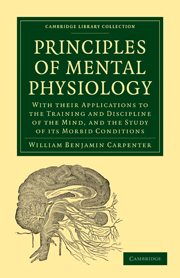 Principles of Mental Physiology
Principles of Mental Physiology Book contents
- Frontmatter
- PREFACE
- Contents
- BOOK I GENERAL PHYSIOLOGY
- BOOK II SPECIAL PHYSIOLOGY
- CHAPTER X OF MEMORY
- CHAPTER XI OF COMMON SENSE
- CHAPTER XII OF IMAGINATION
- CHAPTER XIII OF UNCONSCIOUS CEREBRATION
- CHAPTER XIV OF REVERIE AND ABSTRACTION:—ELECTRO-BIOLOGY
- CHAPTER XV OF SLEEP, DREAMING, AND SOMNAMBULISM
- CHAPTER XVI OF MESMEBISM AND SPIRITUALISM
- CHAPTER XVII OF INTOXICATION AND DELIRIUM
- CHAPTER XVIII OF INSANITY
- CHAPTER XIX INFLUENCE OF MENTAL STATES ON THE ORGANIC FUNCTIONS
- CHAPTER XX OF MIND AND WILL IN NATURE
- APPENDIX. DR. FERRIER'S EXPERIMENTAL RESEARCHES ON THE BRAIN
- INDEX
CHAPTER XIX - INFLUENCE OF MENTAL STATES ON THE ORGANIC FUNCTIONS
Published online by Cambridge University Press: 29 August 2010
- Frontmatter
- PREFACE
- Contents
- BOOK I GENERAL PHYSIOLOGY
- BOOK II SPECIAL PHYSIOLOGY
- CHAPTER X OF MEMORY
- CHAPTER XI OF COMMON SENSE
- CHAPTER XII OF IMAGINATION
- CHAPTER XIII OF UNCONSCIOUS CEREBRATION
- CHAPTER XIV OF REVERIE AND ABSTRACTION:—ELECTRO-BIOLOGY
- CHAPTER XV OF SLEEP, DREAMING, AND SOMNAMBULISM
- CHAPTER XVI OF MESMEBISM AND SPIRITUALISM
- CHAPTER XVII OF INTOXICATION AND DELIRIUM
- CHAPTER XVIII OF INSANITY
- CHAPTER XIX INFLUENCE OF MENTAL STATES ON THE ORGANIC FUNCTIONS
- CHAPTER XX OF MIND AND WILL IN NATURE
- APPENDIX. DR. FERRIER'S EXPERIMENTAL RESEARCHES ON THE BRAIN
- INDEX
Summary
564. It has been shown in the preceding Chapters how close is the dependence of the normal action of the Brain upon an adequate supply of pure Blood: serious reduction in its quantity at once producing deficient mental activity; whilst a depravation of its quality occasions a perversion of that activity. And thus it comes to pass that very slight departures from the health of the Body exert a most powerful influence upon our intellectual, and still more upon our emotional condition, through the deterioration they produce in the circulating fluid (§ 552). The functional activity of the Brain is also affected, through its nervous connections, by the physical condition of remote parts of the body; various aberrant phenomena being traceable to such “morbid sympathies.” But what we have now to consider is the converse power exerted by Mental states over the functions of Nutrition and Secretion, so as to modify not merely the movements, but the molecular actions, of various parts of the body. This power (it has been already shown, §§ 112–115) is for the most part exercised through the Sympathetic system of Nerves; and whilst the regulation of the calibre of the arteries, which determines the quantity of blood supplied to each part, seems to be effected through the motor fibres which that system receives from the Cerebro-spinal, its influence over the condition of the Blood itself, and the use that is made of it, appears to be exerted through its own proper fibres and ganglia.
Information
- Type
- Chapter
- Information
- Principles of Mental PhysiologyWith their Applications to the Training and Discipline of the Mind, and the Study of its Morbid Conditions, pp. 676 - 690Publisher: Cambridge University PressPrint publication year: 2009First published in: 1874